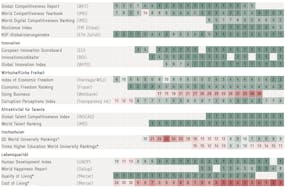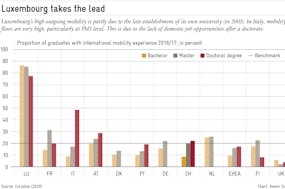Should an Uber driver be considered as an employee or an independent? What about an individual who works in an office by day and delivers meals ordered through an online platform on an ancillary basis (ex. Deliveroo in France or in the United Kingdom)? People with “modern” jobs may find themselves in rather ambiguous situations at times; according to the criteria in force, certain forms of work cannot be clearly categorized under self-employed or regular employment.
The distinction between “dependent or independent” is important, as it determines the extent of the coverage provided by social insurances. Despite some clear weaknesses, the existing categories are firmly anchored in practice. Given the expected medium term increase in the number of “digital workers” and the upward prominence of online platforms, Avenir Suisse suggests , in a new publication, creating a third category for this type of scenario: “independent workers”.
Main characteristics defining an “independent worker” status
On a voluntary basis. The independent worker status is considered to be an additional option for both people providing jobs and those seeking them. Choosing this new status is entirely voluntary: neither the employer or principal, nor the person producing the work is under the obligation to select this option. If the status as independent worker is not chosen by either party, then the regular legal framework (dependent or independent activity) is applicable.
Opting-in. Both parties must expressly (not implicitly) accept the independent worker status. Concurrently, the administrative work must be minimized. It is important that consent be validly given online.
According to work (activity) and not to the person. The independent worker status is linked to the activity, and must be chosen for each task performed (as is currently the case for social insurances). The status is therefore not specifically linked to an individual, neither is it systematically applied to all the activities of a given person. The independent worker status is particularly suitable for short-term, occasional or irregular activities. It can also be applied when it is difficult to clearly define an activity.
Total contractual freedom. Under the independent worker status, both parties are free to establish the minimal set of requirements: definition of the task to be completed, remuneration, duration and volume of the work. They are not required to fix an activity rate nor define a workplace; a specific remuneration for personal days and public holidays is not mandatory, neither is setting a notice period. As soon as an end is put to the independent worker’s status, the usual employment or self-employed activity provisions are applicable.
One-time social insurance coverage. Independent workers benefit from a one-time social insurance coverage which is similar to that of normal employees, but less extensive. Contributions are divided equally with the contracting company. This coverage includes AVS, a minimum contribution to the occupational pension (from the first franc and minus the coordination deduction) and a minimum insurance coverage in case of sickness or accident. Given that independent workers can decide the extent of their work for themselves (for example by not connecting to online tendering platforms), the unemployment risk is not covered. Consequently, there is no obligation to contribute to the unemployment insurance.
Legal security. The status as an independent is recognized by social insurances. Both parties (companies/ independent workers) benefit from a legal framework. There is no risk of an a posteriori requalification.
Social partnership. In sectors with many “independent workers”, the general employment conditions can be negotiated either with those directly concerned, or with union trades or other organizations representing the rights of independent workers (similar to collective labor agreements). It should not be possible to unilaterally modify these general working conditions.
Preventing abuse. The independent status has one decisive advantage: it simplifies the administrative monitoring of complex, occasional or multiple work relations. However, it must not be used to circumvent the standard employment contract. Determining a limit for maximum revenue (within the same company) could prevent risks of abuse. In the case where this limit would be exceeded, the usual employee or self-employed provisions would be applicable.

Online platforms’ personnel are typically considered as “independent workers”. (Image: Fotolia)
A more radical solution would be to remove the distinction between independent worker and employee altogether. It would be tempting, but impractical overall. In fact, the absence of any differentiation would oblige independents to contribute to social insurances that were previously optional; such as occupational pensions, loss of earnings in case of sickness and unemployment insurance. We prefer the suggested solution of an additional voluntary status. In unclear cases, the new status would provide an additional option without affecting the other two existing categories.






